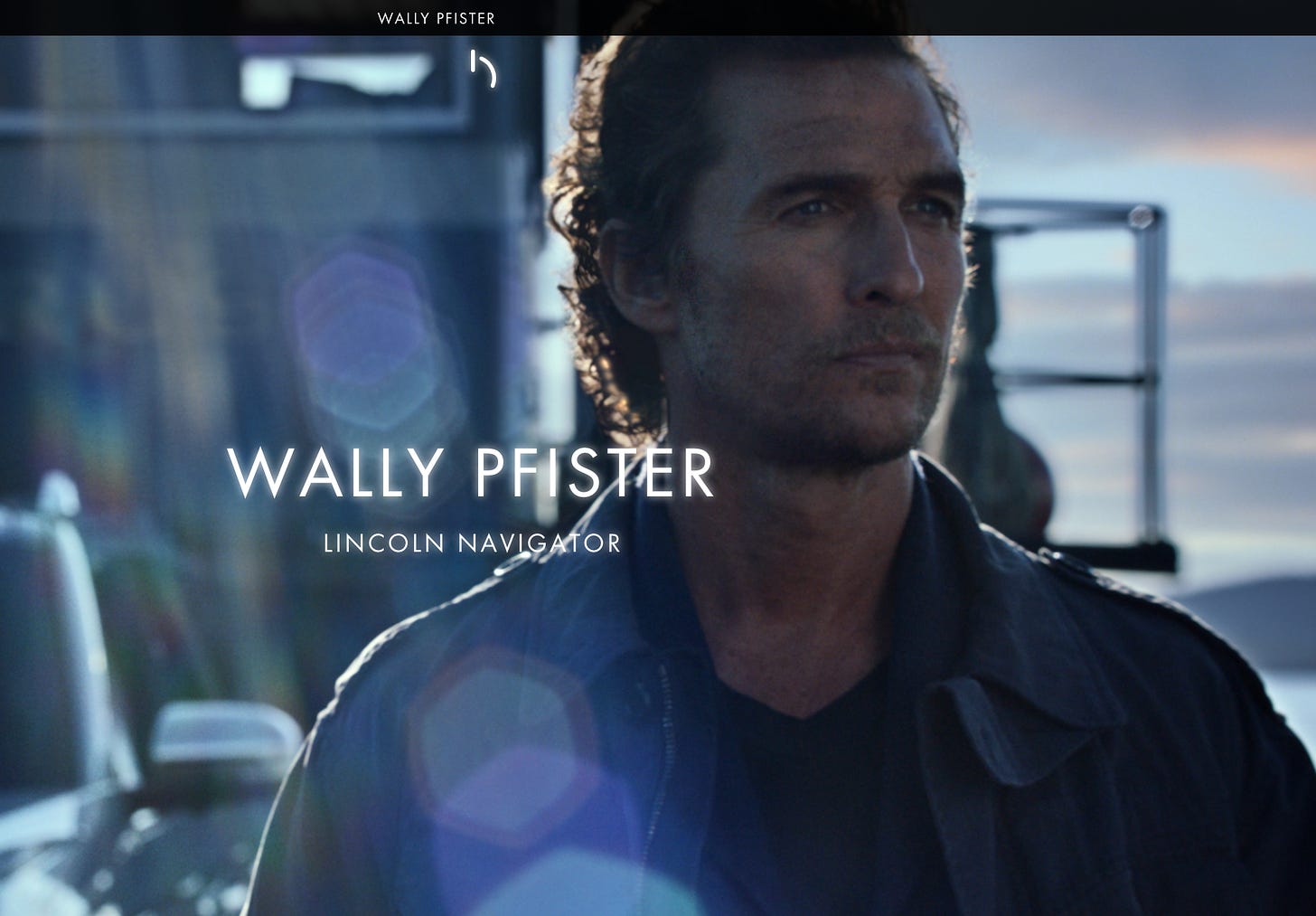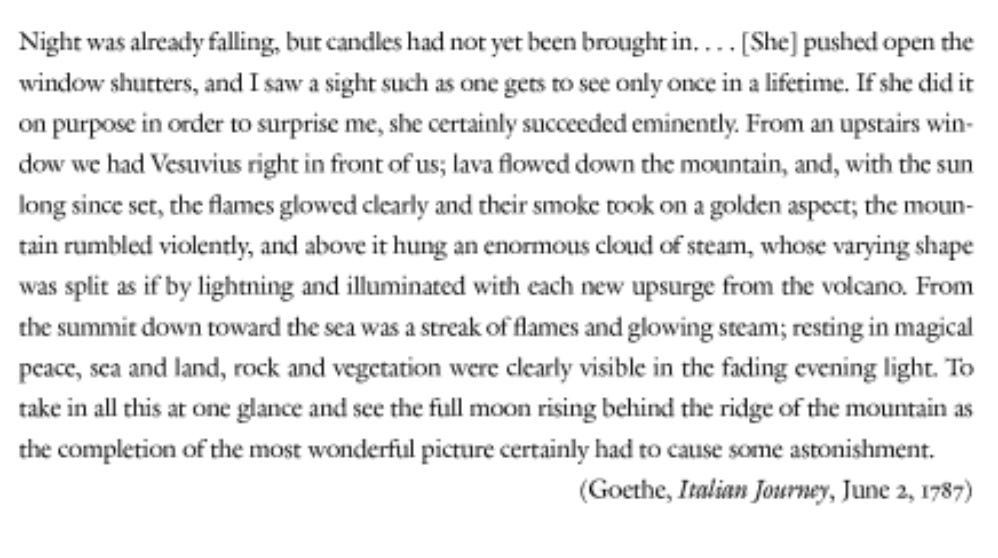Chartbook #175 Fortune Favors the Brave: the making of crypto ideology, Vesuvius and the romantic sublime.
Cryptonaughts.
“History is filled with almosts. With those who almost adventured, who almost achieved, but ultimately, for them it proved to be too much. Then, there are others. The ones who embrace the moment, and commit. And in these moments of truth . . . they calm their minds and steel their nerves with four simple words that have been whispered by the intrepid since the time of the Romans. Fortune favours the brave.”
I’ve been mulling these lines ever since I first saw the ad spot for crypto.com done by Matt Damon during a football game back in the autumn of 2021.
Following the FTX collapse, I returned to the crypto.com spot for my latest op ed for the FT, which is running this weekend.
The spot was for Crypto.com, which in 2021 described itself as the world’s fastest-growing cryptocurrency platform, serving over 10 million customers and issuing the Crypto.com Visa Card — what they claimed was the world’s most popular crypto card program. Crypto.com describes itself as
“committed to building the future of the internet: Web3. Powered by cryptocurrency, Web3 will be more fair and equitable, owned by the builders, creators and users. The new ad, “Fortune Favors the Brave,” which stars Matt Damon, is directed by Oscar-winner and Chicago-born Wally Pfister and produced by David Fincher, highlights the company’s own ethos, while inspiring those who want to change the course of history with a timeless phrase first uttered thousands of years ago. Created by San Francisco-based Pereira O’Dell, the gorgeous 60-second video centers around Damon taking viewers on a historical journey of brave men and women in the hopes of inspiring people to be their bravest selves.”
Credit for the ambitious spot goes to VFX agency, The Mill, who proudly declare that the campaign, in the autumn of 2021, “coincides with the early stages of mainstream adoption of cryptocurrency. The campaign … pays homage to those who got us to this point and is an invitation to those who will soon join the journey toward financial independence and self-determination.”
The team involved in producing this vision includes:
Wally Pfister, the Director, earned his reputation as cinematographer for such films as The Dark Knight, The Prestige and Moneyball. His longstanding collaboration with director Christopher Nolan netted him several Academy Award nominations, and in 2011 he won the award for his groundbreaking work on Inception. He now specializes in high-end star-studded adverts:
As Crypto.com Co-Founder and CEO, Kris Marszalek declared. “We’re very excited to introduce our company to a global audience inviting them to our secure platform with a message focused on financial independence and self-determination.”
The link to Damon was provided by Water.org, Damon’s global nonprofit organization that brings safe water and sanitation to people in need. Crypto.com made a $1M direct donation to Water.org to support their mission and launched “initiatives to encourage more than 10M users around the world to support the cause”.
As the press releases had it:
“Together, Crypto.com and Water.org believe in equal access to the platforms and life-changing resources that support self-determination. Through this unique partnership, crypto users across the globe can join in to support this mission. “Much like what we’re doing with Water.org, Crypto.com is a cryptocurrency platform that shares my commitment to empowering people around the globe with the tools needed to take control of their futures,” said Matt Damon. “They have built a crypto platform that is accessible and puts people first.”
The spot was introduced to US audiences during Fox Sports’ broadcast of Thursday Night Football with the Packers taking on the Cardinals. It was then to be rolled out across Crypto.com’s portfolio of global brand partnerships ranging from Formula 1, UFC, Paris Saint-Germain, and the NBA’s Philadelphia 76ers, to the NHL’s Montreal Canadiens, esports team Fnatic, Aston Martin Cognizant Formula 1 Team, and Lega Serie A, the Italian Football league.
This gives an impression of the reach of crypto’s influence. It was budgeted at $100 million, encompasses more than 20 countries and will run for “several months.” Launched at the same time as FTX’s $20 million U.S. ad campaign, featuring football quarterback Tom Brady and his wife Gisele Bündchen, the crypto.com-Damon campaign represented the peak of crypto’s commercial visibility.
In the FT piece I address the notions of history and agency mobilized by the bombastic advertising script. What does it mean to say that fortune favors the brave? Are success and failure not matters of judgement and power? How has a system of digital tokens supposedly devised for a world of zero-trust, morphed into something akin to a faith-based community, fueled by a glitzy ethic of historical agency and voluntarism.
For a fascinating expansion of the crypto.com’s ideological script and its visual representation, it is worth checking out the “Making of”-video that documents the filming of the 1-minute spot. Thankfully, this is available for your viewing pleasure on Vimeo.
The film-makers describe how they construct a hybrid world of VFX and live action, in which Damon marches through an empty white hall - what they call “the museum of bravery” - in which images appear around him as examples of perseverance and bravery. These include a virtual renderings of Magellan-like figure ….
An Edmund Hillary-like figure scaling a snowy mountain…
A couple picking up courage to announce their mutual attraction.
And a multi-ethnic group of astronauts featuring tell-tale reference to the mythic founder of bitcoin.
As the top management of crypto.com tell the camera:
Fortune favors the brave is not just a line for a campaign. It is genuinely how cyrpto. com sees the world. … Fortune favors the brave is deeply personal. It is how we live. It is what we believe in. This decade belongs to cyrpto!
The spot is impressive not only for its visuals but also for its historical sweep. It is also, however, impressively weird.
The phrase “fortune favors the brave” is generally attributed to Pliny the Elder, the obsessive scholar and Roman Fleet commander. He uttered it on the fateful night of August 24 79 AD when the volcano Vesuvius erupted and buried Herculaneum and Pompeii. As recalled 25 years later, at the request of Tacitus, by his nephew Pliny the Younger, Pliny the Elder ignored the advice of his helmsman and steered directly towards the eruption, hoping to pull off a famous rescue. Instead, he was overwhelmed, lost control of the situation and finally, in ridiculous circumstances, succumbed to the fumes, becoming one of the thousands of casualties.
Generations of scholars have debated the meaning of the incident as described by Pliny the Younger. Umberto Eco for one argued that the younger Pliny was an apologist for his dead uncle. But recent revisionist scholarship by Tom Keeline, argues the opposite. Uncle Pliny was an anti-model, a man so stuck in his obsessive pursuit of scholarly learning that he could not respond appropriately or successfully to the unprecedented situation:
We see a man who not only is not in control of the situation (although as commander of the fleet he was certainly supposed to be), but who altogether fails to understand it. He appears brave, in a sense, and just as he is given full credit in 3.5 for being a man of great learning, he is here acknowledged to be fearless—but this fearlessness is throughout presented as recklessness.51 He sets a course where others rightly fear to tread, and we see him clearly linked to his practices in Ep. 3.5.15:
In itinere quasi solutus ceteris curis, huic uni uacabat.
When traveling he was as it were free from all other cares and devoted himself to this (i.e., studia) alone.
The Elder thus continues his normal routine, as he has been doing all along, but this is fundamentally the wrong course of action.52 Just as in Ep. 3.5, he has someone at his side to take down his every word as he travels. Our man of science has his head somewhere in Cloudcuckooland, not in the real world of people living and dying. While a volcano is spewing death and destruction he is focused on dictation. Then conditions worsen. Ash begins falling on the ship, and it gets hotter and denser the closer they get to the coast; soon they are being bombarded by actual rocks (Ep. 6.16.11). Here the Elder hesitates a moment, but he determines to brazen it out (Ep. 6.16.11):
Cunctatus paulum an retro flecteret, mox gubernatori ut ita faceret monenti "Fortes" inquit "fortuna iuuat: Pomponianum pete."
Unsure for a moment whether he should turn back, when the helmsman warns him to do just that he says: "Fortune favors the bold: head for Pomponianus!"
He does not know what he should do, and he receives sound advice from a seaman who plainly does. Perversely, however, this impels him in the opposite direction, and with a misapplied proverb he presses on.53 Rather than favoring him, Fortune will soon take his life.
You might say that evoking Pliny’s famous phrase was more apt than Damon or crypto.com realized.
For a beautifully produced and version of Pliny the Younger’s text translated by Benedicte Gilman and illustrated by Barry Moser, check out Ashen Sky.
But Vesuvius does not belong only to the classical tradition. In the 18th century, the volcano would become one of the quintessential sites of the romantic sublime. Here is Goethe describing his first encounter with the volcano in 1787.
But, what enabled Goethe and others to appreciate the volcano was not simply personal courage, or inclination, but, as a recent article by John Brewer shows, a network of expertise, local guide knowledge and tourist promotion that made the volcano into a European hub.
This article examines the activities of guides on the volcano Mount Vesuvius in the late eighteenth and nineteenth centuries. They worked in a double capacity—as aids to savants seeking to unlock the scientific secrets of the volcano and as the creators of a tourist infrastructure that helped visitors enjoy the sublime experience of a steadily erupting volcano. The essay examines their contribution to scientific knowledge of the volcano and their role in developing sublime tourism, a phenomenon that, despite an earlier existence, burgeoned in the late eighteenth century. It argues that guides were vital to both, but that a long-standing attempt to circumscribe their role as knowledge makers grew more and more effective in the nineteenth century, as mineralogists’ concern with specimens (shared by so many visitors and amateurs) gave way to geologists’ concern for the interrelations of rocks and strata, and as the Neapolitan state developed scientific institutions, notably the volcanic observatory with its instruments on the slopes of the volcano, that took over functions previously served by the guides. Though the guides—or some of them—were able to profit from the flow of visitors, not least because of their special knowledge and skills, their activities were also transformed as the growth of a state infrastructure of roads and railways pushed them to the margins, and as transnational organizations, like the Thomas Cook travel agency, absorbed their labor.
From failed Roman commanders, to the intermingling of tourism, commerce and science - in the end, perhaps, the unconscious evocation of Pliny and the Vesuvius disaster at the height of the crypto boom, by Matt Damon, crypto.com and their image-makers was less incongruous than it at first seemed.













Ha! Chartbook #175. Why I will ALWAYS subscribe.
Out of the blue. Through the roof. Clichés fail me.
In your FT article you stated "Letting crypto burn may no longer be realistic. If that is the case..."
But I really like the alternative solution suggested by FT Alphaville column a few days ago--Let crypto burn." Why is this no longer realistic?
In addition, Unhedged, also at FT, argued recently that "we really don't know yet what crypto assets are? Currencies? Commodities, Investment contracts? Ownership of payment infrastructure? Game pieces, Plain bullshit?"
Is your assumption that crypto should be regulated in some way (under the rubric of gambling rather than banking) partially biased by your apparent general preference for more centralized regulatory control which in my opinion often ends up stabilizing a quite corrupt international (World Bank etc.) as well as domestic (U.S Federal Reserve managed) financial structure?